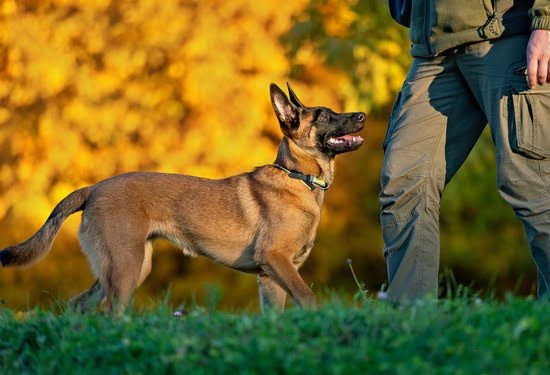Is your furry friend more interested in treats than anything else? In this article, we will explore how to train a dog that is too food motivated. Understanding food motivation in dogs is crucial when it comes to effective training techniques. From identifying signs of excessive food motivation to incorporating positive reinforcement methods, we will delve into the world of training a dog who just can’t resist a tasty snack.
Many dog owners may find themselves struggling with a canine companion who seems to prioritize food above all else. While having a food-motivated dog can present its own set of challenges, it also offers unique opportunities for building a strong bond through training. By recognizing the signs of a dog that is too food motivated and setting realistic training goals, you can create a fulfilling and rewarding training experience for both you and your furry friend.
Training a food-motivated dog requires patience, consistency, and an understanding of their unique needs. In this section, we will explore the importance of training a food-motivated dog and discuss positive reinforcement techniques to help them succeed.
By incorporating play and mental stimulation into their training regimen, you can keep your dog engaged and focused on learning new behaviors. Join us as we navigate the world of training with food-motivated dogs and discover the keys to success in building a strong bond with your canine companion.
Signs Your Dog Is Too Food Motivated
Obsession With Food
One of the clear signs that your dog is too food motivated is when they display an excessive focus on food. This can manifest as constantly searching for food, begging for treats or constantly sniffing around in search of any edible items. Dogs that are overly fixated on food can become easily distracted during training sessions or even exhibit aggressive behavior to protect their food.
Rapid Weight Gain
Another sign that your dog may be too food motivated is rapid weight gain. If your canine companion is consuming excessive amounts of treats or food during training sessions, it can lead to unhealthy weight gain. It’s important to strike a balance between rewarding your dog and maintaining their overall health and well-being.
Difficulty Responding to Commands Without Food
A dog that relies heavily on treats for obedience may struggle to respond to commands without the presence of food rewards. This reliance on treats can hinder the training progress and may lead to challenges in real-life situations where treats are not readily available. To address this issue, it’s crucial to gradually wean off the use of treats and reinforce desired behaviors with other forms of rewards such as verbal praise, toys, or affection.
By recognizing these signs in your dog, you can take proactive steps to address their over-reliance on food rewards and create a well-rounded training program that focuses on building a strong bond with your furry friend. Incorporating a variety of positive reinforcement techniques and engaging activities will help you train a dog that is too food motivated effectively while promoting a healthy relationship based on trust and communication.
Importance of Training a Food-Motivated Dog
Food motivation plays a significant role in training dogs, as it can be a powerful tool for reinforcing desired behaviors. However, when a dog is excessively food motivated, it can present some challenges in training. Understanding the importance of training a food-motivated dog is essential to ensure successful and effective training outcomes.
One of the key reasons why it is important to train a food-motivated dog is to establish a bond built on mutual trust and respect. By using food as a reward during training sessions, you are creating positive associations with learning and obeying commands. This helps strengthen the bond between you and your dog, as they learn to trust that following your instructions will result in something they desire – treats.
In addition, training a food-motivated dog can also improve their overall behavior and manners. By teaching them basic obedience commands and engaging them in structured training exercises, you are helping them develop self-control and impulse management. This not only makes them easier to handle in various situations but also enhances their focus and attentiveness. Now, let’s delve into how to train a dog that is too food motivated effectively:
- Start with High-Value Treats: Use treats that your dog finds irresistible but also make sure they are small enough that your dog can quickly consume them without losing focus.
- Practice Short Training Sessions: Dogs with high food motivation can get overly excited during training, leading to hyperactivity or loss of focus. Keep training sessions short (5-10 minutes) to prevent overwhelm.
- Gradual Exposure to Distractions: As you progress with training, gradually introduce distractions while maintaining your pup’s focus on the task at hand. This will help improve their impulse control.
Setting Realistic Training Goals for a Food-Motivated Dog
Food-motivated dogs can be a joy to train, as they are eager to work for treats. However, it is essential to set realistic training goals to ensure success without overwhelming your pup. Here are some tips on how to train a dog that is too food motivated:
1. Understand Your Dog’s Behavior: Before starting any training regimen, observe your dog’s behavior around food. Note how quickly they respond to food rewards, how focused they become when treats are present, and if they show signs of possessiveness or obsession over food.
2. Start Small and Gradually Increase Difficulty: Begin with simple commands like “sit” or “stay” using high-value treats. Once your dog understands the basics, gradually increase the level of difficulty by introducing distractions or longer duration for commands.
3. Use Variable Reinforcement: Instead of rewarding your dog every single time they perform a desired behavior, mix in intermittent reinforcement where they only receive a treat occasionally. This will help prevent over-reliance on food rewards and encourage sustained obedience even without constant treats.
Remember that every dog is unique, so it may take some trial and error to find the right balance of training techniques that work best for your food-motivated pup. With patience, consistency, and the right approach, you can successfully train a dog that is too food motivated while strengthening the bond between you and your furry friend.
Positive Reinforcement Techniques for Food-Motivated Dogs
Using Treats Wisely
When training a dog that is too food motivated, it is crucial to use treats wisely to prevent over-reliance on food rewards. One effective technique is to vary the value of treats used during training sessions. Use high-value treats, such as small pieces of cooked chicken or cheese, for more challenging commands or behaviors.
For simpler tasks, you can opt for lower-value treats like commercial dog biscuits. By mixing up the rewards, you can keep your dog engaged and motivated without creating an unhealthy dependence on food.
Utilizing Clicker Training
Clicker training is a powerful tool for positively reinforcing desired behaviors in food-motivated dogs. The clicker serves as a marker that signals to your dog when they have performed the correct action and will receive a treat. This method helps dogs understand exactly what behavior is being rewarded, leading to faster and more effective learning.
To implement clicker training with a highly food-motivated dog, start by associating the sound of the clicker with receiving a treat during short training sessions. Soon enough, your pup will start associating the click with positive outcomes and be more eager to learn.
Teaching Impulse Control
One common challenge when training a food-motivated dog is teaching them impulse control around food rewards. To address this issue, incorporate exercises that focus on patience and self-control into your training routine. Start by asking your dog to wait before taking the treat from your hand or going for their food bowl until given permission.
By gradually increasing the duration of waiting times, you can help your dog develop better impulse control and prevent them from becoming overly fixated on food rewards during training sessions. Remember that consistency and positive reinforcement are key in building self-control in a highly food-motivated pup.
Incorporating Play and Mental Stimulation in Training
Food-motivated dogs can be a joy to train, but their strong desire for treats can sometimes pose challenges during training sessions. Incorporating play and mental stimulation in their training routine can be highly effective in keeping them engaged and focused.
One way to do this is by using interactive toys that dispense treats when the dog completes a task or solves a puzzle. This not only provides mental stimulation but also encourages the dog to work for their rewards, rather than simply relying on handouts.
In addition to using interactive toys, incorporating play into training sessions can help break the monotony of repetitive commands and keep a food-motivated dog excited about learning. Playing games like fetch or tug-of-war as part of the training process can reinforce positive behavior without relying solely on treats. This allows the dog to expend energy and have fun while still engaging in important training exercises.
Another effective way to incorporate play and mental stimulation in training is by introducing scent games. Dogs have an incredible sense of smell, and utilizing this natural ability can provide both physical exercise and mental challenge during training sessions with food-motivated dogs. For example, hiding treats around the house or yard for the dog to find not only encourages them to use their noses but also keeps them mentally stimulated and focused on the task at hand.
| Key Points | Description |
|---|---|
| Interactive Toys | Toys that dispense treats when tasks or puzzles are completed. |
| Play | Incorporating games like fetch or tug-of-war into training sessions. |
| Scent Games | Engaging a dog’s sense of smell by hiding treats for them to find. |
By incorporating play and mental stimulation into training sessions, you can effectively engage your food-motivated dog while reinforcing positive behaviors. These techniques not only provide variety in training but also offer opportunities for physical exercise and mental challenge that go beyond simple treat rewards.
Remember that each dog is unique, so it may take some trial and error to find the right combination of activities that work best for your furry friend. With patience and consistency, you can build a strong bond with your food-motivated dog through interactive and engaging training methods.
Dealing With Challenges
Dealing with a food-obsessed dog can present a unique set of challenges for pet owners. These dogs may constantly beg for food, steal items from counters, or show signs of aggression when it comes to meal times. It is crucial to address this behavior early on to prevent any future issues and ensure a healthy relationship with your furry companion.
One effective way to overcome food obsession in dogs is through controlled feeding practices. This involves establishing a routine feeding schedule and providing meals in designated areas. By doing so, you can help your dog understand that they will receive their meals at specific times and locations, reducing their fixation on food throughout the day.
In addition to controlled feeding, implementing training exercises that focus on impulse control can be beneficial for food-motivated dogs. Teaching your dog basic commands like “sit,” “stay,” and “leave it” can help them learn self-control and patience when it comes to food. Rewarding good behavior with treats or praise will reinforce their positive actions and gradually reduce their obsession with food.
| Facing Food Obsession | Overcoming Techniques |
|---|---|
| Controlled Feeding | Establish routine feeding schedule and designated feeding areas |
| Impulse Control Training | Teach basic commands like “sit,” “stay,” “leave it” |
Consistency and Patience
When it comes to training a dog that is too food motivated, consistency and patience are key. Food-motivated dogs can be both a joy and a challenge to train, as their strong drive for treats can lead to quick learning but also potential behavior issues if not managed properly. It is important for dog owners to understand that these pups may need extra guidance and structure in their training regimen.
One important aspect of training a food-motivated dog is to establish clear boundaries and rules from the start. Consistency in enforcing these rules will help the dog understand what is expected of them, even when food is involved.
For example, if you are using treats as rewards during training sessions, make sure your dog only receives the treat when they have successfully completed the desired behavior. This will prevent them from becoming overly reliant on treats and help maintain their focus on following commands.
Patience is another crucial element when working with a food-motivated dog. While these dogs may pick up new behaviors quickly due to their eagerness for treats, it is essential to remember that learning takes time and repetition.
Be patient with your pup as they navigate through the training process, and do not rush or become frustrated if they do not grasp a concept right away. With consistent practice and positive reinforcement, you can effectively train a dog that is too food motivated while strengthening your bond with them in the process.
Conclusion
Training a dog that is too food motivated can be both rewarding and challenging. By understanding the signs of food motivation in your furry friend, you can tailor your training methods to suit their needs effectively. It’s crucial to set realistic goals while training a food-motivated dog, ensuring that they are challenged but not overwhelmed by the process.
Positive reinforcement techniques are paramount when working with a dog that is highly food motivated. By using treats strategically and incorporating play and mental stimulation into training sessions, you can keep your pup engaged and eager to learn. However, it’s essential to strike a balance and avoid reinforcing any negative behaviors that may arise from excessive focus on food rewards.
In conclusion, building a strong bond with a food-motivated dog through training requires consistency, patience, and understanding. Remember that each dog is unique, so be prepared to adjust your approach as needed. With perseverance and the right techniques, you can successfully train a dog that is too food motivated while strengthening your relationship along the way.
Frequently Asked Questions
How Do I Stop My Dog From Being So Food Motivated?
One way to stop your dog from being so food motivated is to establish a consistent feeding schedule and avoid free-feeding. Provide mental stimulation through interactive toys or puzzles to redirect their focus away from food. Incorporating obedience training can also help shift their attention.
How Do I Train My Dog Not Motivated by Food?
Training a dog that is not motivated by food can be challenging but not impossible. Find out what other rewards or activities your dog enjoys, such as playtime, belly rubs, or going for walks, and use those as incentives during training sessions. Consistency and patience are key in motivating a food-indifferent dog.
How Do I Stop My Dog From Demanding Food?
To stop your dog from demanding food, it’s important to set boundaries and establish a routine when it comes to feeding time. Ignore any begging behavior and only reward them with food when they are calm and patient. Providing enough physical exercise and mental stimulation can also help decrease their fixation on food.

Welcome to the blog! I am a professional dog trainer and have been working with dogs for many years. In this blog, I will be discussing various topics related to dog training, including tips, tricks, and advice. I hope you find this information helpful and informative. Thanks for reading!





